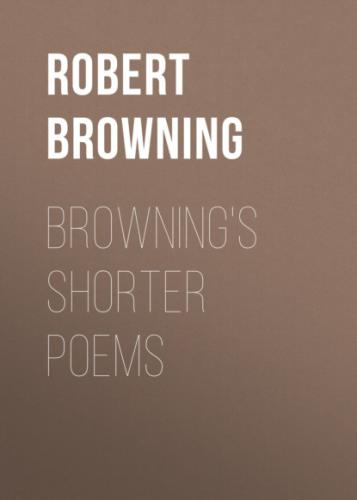The gleams of knowledge which we possess are of chief value because they "sting with hunger for full light." The goal of knowledge, as of love, is God himself. Its most precious part is that which is least positive—those momentary intuitions of things which eye hath not seen nor ear heard. The needs of the highest parts of our humanity cannot be supplied by ascertained truth, in which we might rest, or which we might put to use for definite ends; rather by ventures of faith, which test the courage of the soul, we ascend from surmise to assurance, and so again to higher surmise.
—Condensed from EDWARD DOWDEN, Studies in Literature.
… Browning has not cared for that poetic form which bestows perennial charm, or else he was incapable of it. He[page xxii] fails in beauty, in concentration of interest, in economy of language, in selection of the best from the common treasure of experience. In those works where he has been most indifferent, as in the Red Cotton Night-Cap Country, he has been merely whimsical and dull; in those works where the genius he possessed is most felt, as in Saul, A Toccata of Galuppi's, Rabbi Ben Ezra, The Flight of the Duchess, The Bishop Orders his Tomb in Saint Praxed's Church, Hervé Riel, Cavalier Tunes, Time's Revenges, and many more, he achieves beauty, or nobility, or fitness of phrase such as only a poet is capable of. It is in these last pieces and their like that his fame lies for the future. It was his lot to be strong as the thinker, the moralist, with "the accomplishment of verse," the scholar interested to rebuild the past of experience, the teacher with an explicit dogma in an intellectual form with examples from life, the anatomist of human passions, instincts, and impulses in all their gamut, the commentator on his own age; he was weak as the artist, often unnecessarily and by choice, in the repulsive form—in the awkward, the obscure, the ugly. He belongs with Jonson, with Dryden, with the heirs of the masculine intellect, the men of power not unvisited by grace, but in whom mind is predominant. Upon the work of such poets time hesitates, conscious of their mental greatness, but also of their imperfect art, their heterogeneous matter; at last the good is sifted from that whence worth has departed. —From GEORGE EDWARD WOODBERRY'S Studies in Letters and Life.
When it is urged that for a poet the intellectual energies are too strong in Browning, that for poetry the play of[page xxiii] intellectual interests and activities is too great in his work, and that Browning often and at times ruthlessly sacrifices the requirements and effects of art for the expression of thought, that "though he refreshes the heart he tires the brain," we should admit this with regard to a good deal of the work of the third period. We should allow that this is the side to which he leans generally, but still hold that, though to many his intellectual quality and energy may well seem excessive, yet in great part of his work, and that of course, his best, the passion of the poet and his kind of imagination are just as fresh and powerful as the intellectual force and subtlety are keen and abundant.
—JAMES FROTHINGHAM, Studies of the Mind and Art of Robert Browning.
Now dumb is he who waked the world to speak,
And voiceless hangs the world beside his bier,
Our words are sobs, our cry or praise a tear:
We are the smitten mortal, we the weak.
We see a spirit on earth's loftiest peak
Shine, and wing hence the way he makes more clear:
See a great Tree of Life that never sere
Dropped leaf for aught that age or storms might wreak;
Such ending is not death: such living shows
What wide illumination brightness sheds
From one big heart—to conquer man's old foes:
The coward, and the tyrant, and the force
Of all those weedy monsters raising heads
When Song is muck from springs of turbid source.
—GEORGE MEREDITH.
[page xxiv]
CHRONOLOGICAL LIST OF BROWNING'S WORKS
| 1833. | Pauline. |
| 1835. | Paracelsus. |
| 1837. | Strafford (A tragedy). |
| 1840. | Sordello. |
| 1841. | Bells and Pomegranates, No I., Pippa Passes. |
| 1842. | Bells and Pomegranates, No. II., King Victor and King Charles. |
| 1842. | Bells and Pomegranates, No. III., Dramatic Lyrics. |
| Cavalier Tunes. | |
| Italy and France. | |
| Camp and Cloister. | |
| In a Gondola. | |
| Artemis Prologises. | |
| Waring. | |
| Queen Worship. | |
| Madhouse Cells. | |
| Through the Metidja. | |
| The Pied Piper of Hamelin. | |
| 1843. | Bells and Pomegranates, No. IV., The Return of the Druses (A tragedy). |
| 1843. | Bells and Pomegranates, No. V., A Blot In the 'Scutcheon (A tragedy). |
| 1844. | Bells and Pomegranates, No. VI., Colombe's Birthday (A play). |
| 1845. | Bells and Pomegranates, No. VII. "How they Brought the Good News from Ghent to Aix." |
| Pictor Ignotos. | |
| The Italian in England. | |
| The Lost Leader. | |
| The Lost Mistress. | |
| Home Thoughts from Abroad. | |
| The Bishop Orders his Tomb.[page xxv] | |
| Garden Fancies. | |
| The Laboratory. | |
|
|
